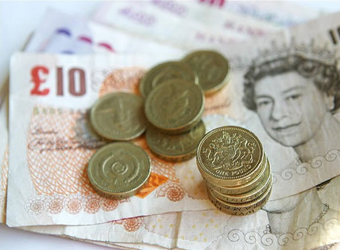Sterling rebounded modestly on Friday after its biggest one-day fall since the week after June 2016’s Brexit vote, with robust services data barely cushioning the blow from the Bank of England’s pushing-back of rate hike expectations on Thursday.
Despite the Bank raising rates for the first time in over a decade, it also told markets to expect only two further hikes in the next three years.
That sent the pound sliding by almost 1.7 percent on a trade-weighted basis – its poorest showing since June 27, 2016, in the aftermath of Britain’s shock vote to leave the European Union – as markets pushed back their bets on when the BoE would next hike rates to November 2018.
Data showing Britain’s dominant services sector growing at its fastest rate in six months gave the pound a modest lift on Friday, with the currency trading up 0.2 percent at $1.3090.
But that still left it down well over 1 percent against the dollar since the BoE’s policy decision.
“The fairly muted reaction (to the data) suggests that investors may be redirecting energy and attention elsewhere. Thursday’s dovish rate hike has not only encouraged sellers to pummel sterling but has also heavily bruised buying sentiment towards the currency,” said Lukman Otunuga, an analyst at FXTM.
“With the bias towards the pound currently tilted to the downside, any appreciation could be viewed as … an opportunity for bears to begin fresh rounds of selling.”
The pound was given a brief further boost by U.S. labour market data indicating that a slightly lower-than-expected number of jobs were added in October. Brief dollar weakness allowing the pound to trade as high as $1.3134, but it quickly retreated as the U.S. currency recovered.
Sterling was also trading 0.4 percent up against the euro on Friday, after suffering its worst one-day drop on Thursday against the single currency since a “flash crash” on Oct. 7, 2016, when a sudden plunge briefly shaved a tenth off the pound’s value.
“Were it not for well-above-target inflation, it appears highly unlikely that yesterday’s historic hike would have occurred, and the pound remains susceptible to further declines going forward,” said David Cheetham, chief market analyst at X-Trade Brokers.
BoE Deputy Governor Ben Broadbent said on Friday that the Bank’s signal that it may need to raise interest rates two more times was “not a promise”, responding to a question about the BoE’s previous attempts to signal the likely path for interest rates.


